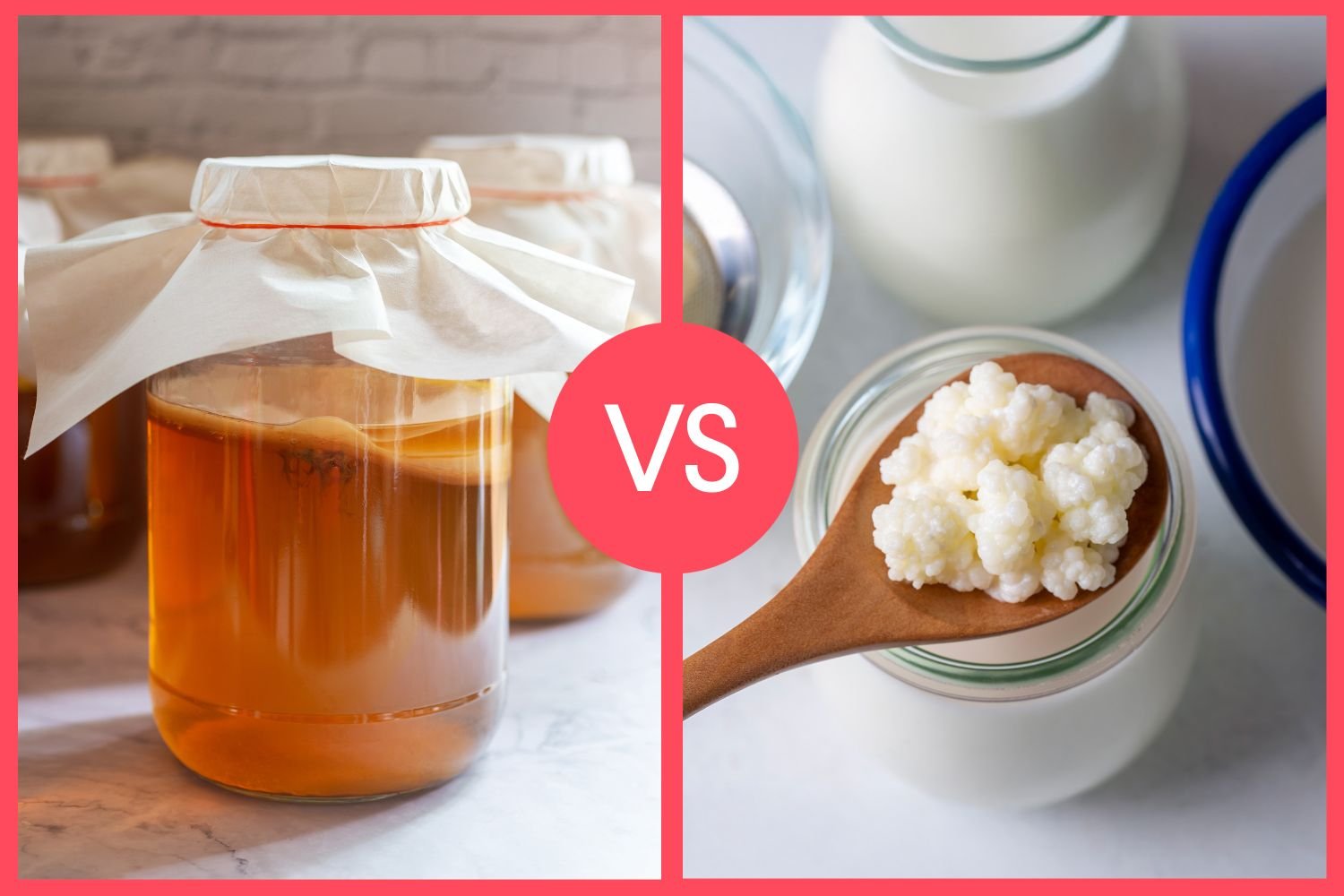:max_bytes(150000):strip_icc():format(jpeg)/kombucha-vs-kefir-GettyImages-1399229128-14da84e39ac54675b3d50a5ca5b679c0.jpg)
Key Takeaways
- Both offer gut-health benefits — Kombucha (fermented tea) and kefir (fermented milk) provide probiotics, antioxidants, and anti-inflammatory properties, supporting digestion and overall wellness.
- Nutritional differences — Kombucha is lower in calories and dairy-free, making it a good antioxidant-rich soda alternative, while kefir delivers more protein, calcium, vitamin D, and B12, making it a nutrient-dense choice for bone and immune health.
- Best choice depends on needs — Kombucha may suit those avoiding dairy or who want a fizzy, lower-sugar beverage; kefir may be better for individuals seeking more protein and micronutrients, especially for bone and nerve support.
You may have heard that fermented foods are good for gut health—think sauerkraut, kimchi, and tempeh. The rumors are true. Fermentation increases live and active cultures (aka probiotics), which can increase the diversity of “good” microbes in your gut ecosystem.
But, fermented foods aren’t the only sources of beneficial microorganisms. Enter fermented drinks, such as kombucha and kefir. Since both are fermented, they each provide some gut-friendly probiotics, but they’re not interchangeable. Here’s where the two overlap, where they differ, and how to ultimately choose between kombucha vs. kefir for the healthiest drink for you.
What Is Kombucha?
Kombucha is a popular fizzy drink made from fermented tea. What kind of tea? Black, green, oolong—you name it. “The type of tea doesn’t necessarily affect the fermentation, but it can give a boost of antioxidants,” says Meggie Connelly MS, RDN, culinary dietitian and founder of PCOS Meal Prep. “For example, green tea-based kombucha may be higher in polyphenols,” Connelly explains. And the fermentation process can even further increase the drink’s polyphenolic contents.
Unsurprisingly, the potential perks of kombucha largely have to do with digestion. It’s been shown to positively influence the gut microbiome, especially in individuals with obesity. However, the benefits don’t stop there. Kombucha also has demonstrated positive effects on cholesterol, inflammation, and metabolism.
Here’s a closer look at some of the nutrients found in 12 ounces of kombucha, per USDA data:
- Calories: 59.5
- Carbohydrates: 14.8 grams (g)
- Fiber: 0 g
- Fat: 0.037 g
- Protein: 0.372 g
- Sugar: 14.8 g
- Riboflavin (B2): 0.1 milligrams (mg)
Kombucha can provide probiotics, antioxidants, and more, but there’s a catch. The nutrition facts can vary greatly from brand to brand or even product to product. “Many commercial versions contain added sugars,” Connelly warns. You can brew your own kombucha to control the sugar content, or check nutrition labels to look for varieties with fewer sugars.
What Is Kefir?
Kombucha is to tea as kefir is to milk, which is to say kefir is a drink made from fermented milk. But wait—doesn’t that sound like Greek yogurt? There are textural differences between kefir and Greek yogurt, but the main difference is that kefir contains yeast, which aids in the fermentation process and affects the resulting taste.
There are many reasons to drink kefir. “It’s rich in protein, calcium, vitamin B12, vitamin D, and gut-healthy probiotics,” explains Sheri Gaw, RDN, CDCES owner of Sheri The Plant Strong Dietitian. There’s also research on kefir’s effects—antioxidant, anti-inflammatory, antimicrobial, and more. Not only can the probiotics positively impact the gut, kefir may also promote healthy cholesterol levels, reduce inflammation, and provide antioxidants. However, more research may be needed, as many of the studies involve animal models.
Here’s a closer look at some of the nutrients found in one cup of kefir, per USDA data: [8]
- Calories: 127
- Carbohydrates: 18.3 g
- Fiber: 0 g
- Fat: 2.34 g
- Protein: 8.76 g
- Sugar: 16.9 g
- Calcium: 303 mg
- Vitamin B12: 0.732 micrograms (mg)
- Vitamin D: 2.44 mcg
You may notice that kefir also contains added sugars. This is something to watch out for, Gaw shares. “Every four grams of added sugar is equivalent to one teaspoon of sugar,” she explains. Her advice to navigate this? Read labels carefully.
Which Fermented Drink Is Better for You?
Kombucha and kefir are both fermented drinks that provide probiotics, antioxidants, and other nutrients. So, what’s the difference—and which is best? Per usual when nutrition is at stake, it depends on the individual. The difference can often come down to personal preference, individual goals and needs, and dairy tolerance.
Kombucha may be the right choice for you if you want a dairy-free option, Connelly notes. Kefir is most often made from cow’s milk, which some people avoid or have intolerances to. Plus, kombucha is a great source of antioxidants, especially when made with green tea. If you’re someone who enjoys a fun beverage, lower-sugar kombucha can be a better alternative to sugar-sweetened drinks like sodas, Connelly adds.
On the other hand, kefir may be the right choice for you if you’re looking to boost your intake of certain nutrients. “It’s the better source of protein, calcium, and vitamin D,” Gaw explains. Plus, it also provides vitamin B12, which makes and supports healthy nerve cells and red blood cells.
Whether you’re ready to try kombucha, kefir, or both, they’re typically carried in most supermarkets. Because they’re both perishable, look for them in the refrigerated section of the grocery store. Kombucha is typically kept near the other refrigerated beverages, such as juices, while kefir is usually shelved with yogurt.

